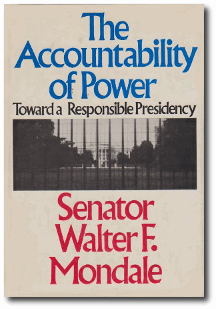
In his commencement address to the University of Minnesota Law School on May 11, 1985, Walter Mondale said, "I see openness in government as the indispensable precondition for the preservation of all of our other freedoms. And perhaps no other principle is as difficult to honor when you're in power . . . when you raise your right hand as an attorney, or as a judge, a legislator, a governor, or even a President, mean it when you swear to support our Constitution."[1]
As a Senator, Mr. Mondale worked to uphold the laws of the Constitution through legislation. Early in his Senate career, Mr. Mondale introduced legislation that addressed the balance of power between the Legislative and Executive branches, he called for a review of the federal structure to ensure efficiency and effectiveness in government, and he cosponsored legislation to protect the right to privacy. In addition, by cosponsoring legislation for full disclosure of income and financial activities of certain government officials as well as cosponsoring a bill to make government agency and committee meetings open to the public, he proved himself a strong advocate, even before Watergate, for openness in government.
When the Watergate scandal broke, Senator Mondale was troubled and angry at the contempt President Nixon displayed for the Constitution. In the forward to his book The Accountability of Power: Toward a Responsible Presidency, Mr. Mondale writes, "Watergate showed the ultimate and most profound usurpation of power by a President in American history. No matter how illegal or deceitful the options, all of them apparently were explored."[2] In April and May of 1973, Senator Mondale insisted on full disclosure of the Watergate affair and cosponsored a senate resolution to appoint an independent prosecutor for Watergate. He was indignant over President Nixon's refusal to hand over tapes to the Special Prosecutor and to obey the courts. In a speech on the Senate floor entitled "The Presidency and Watergate: An Agenda for Reform," Senator Mondale outlined the ways in which the institution of the presidency needed to change. He stated, "We need a strong presidency. But we also need an open and legal presidency, with strong safeguards to protect against the abuses of presidential power."[3] Senator Mondale urged the House to ignore President Nixon's own definition of impeachment and to impeach him. He argued, "There is only one way to hold a sitting president accountable. And a president must be accountable. It rests with the House of Representatives to hold the president accountable. When we denigrate impeachment, we denigrate a device which the framers regarded as essential to a republican form of government. When we ignore impeachment, we ignore an important element in our system of checks and balances. When we allow impeachment to be frustrated by Presidential fiat, we frustrate the Constitution."[4]
Senator Mondale was indignant when President Ford pardoned President Nixon, and introduced a senate resolution granting Congress the power to override a presidential pardon by a two-thirds vote of both Houses of Congress.[5] "President Ford's action on Sunday—pardoning former President Nixon," said Senator Mondale, "may have been an act of mercy toward Mr. Nixon. But I would like to suggest that it was an unfair, unfortunate, and unethical act toward the American people and toward our system of justice." Senator Mondale was concerned that as a result of the pardon, the full truth of Watergate would never fully surface. He argues, "We will not know the truth in order to better legislate remedies to prevent future Watergates. We will not know the truth in order to set the historical record straight on the worst political scandal in American history. We will not even know what Mr. Ford has pardoned—be it misuse of the CIA and FBI, harassing tax audits, the sale of ambassadorships, the compromise of the antitrust laws, or whatever."[6]
Two months after President Nixon's resignation, Congress passed S. 3044, a bill to amend the Federal Election Campaign Act of 1971 providing for public financing of primary and general election campaigns for Federal elective office. Included in the legislation were provisions sponsored by Senator Mondale and Senator Schweiker (R-PA) for public financing of presidential campaigns. Senator Mondale believed that by having publically financed presidential campaigns, the candidate would no longer be beholden to special interest groups: it is the "single most important election reform that can emerge from Watergate. It is absolutely essential if we are ever to get money off the backs of American politicians and restore integrity and confidence in our political system."[7]
In a speech to The Fund for the Legal Aid Society on April 26, 2006, thirty-two years after the Watergate scandal and twenty-one years after his commencement address to the University of Minnesota Law School, Mr. Mondale still believed in upholding our Constitution: "Throughout American history, whenever we have been confronted by serious threats, we have struggle to prevent our fears from overwhelming our belief in our system of law and justice. Set against these fears has been faith: faith in the rule of law; faith that when America protects personal liberties, it is stronger, not weaker; faith that when America honors its Constitution, it is more secure and more powerful in the world."[8]
- Walter Mondale, Commencement Address, University of Minnesota Law School, Minneapolis, MN, May 11, 1985.
- Walter Mondale, The Accountability of Power: Toward a Responsible Presidency (New York: David McKay Company, Inc., 1975), x-xi.
- 93rd Cong., 1st sess., Congressional Record 119 (September 17, 1973) at 29816.
- 93rd Cong., 2nd sess., Congressional Record 120 (June 3, 1974) at 17317.
- 93rd Cong., 2nd sess., Congressional Record 120 (September 18, 1974): at 31551.
- 93rd Cong., 2nd sess., Congressional Record 120 (September 11, 1974) at 30747.
- 93rd Cong., 1st sess., Congressional Record 119 (July 24, 1973) at 25598.
- Walter Mondale, Address to The Fund for the Legal Aid Society, Minneapolis, MN, April 26, 2006.